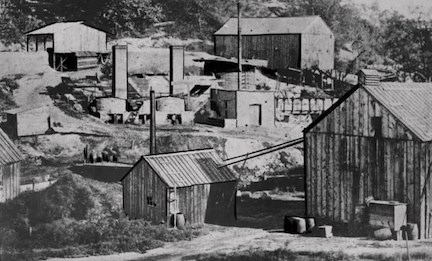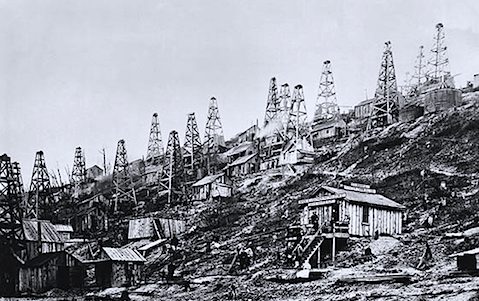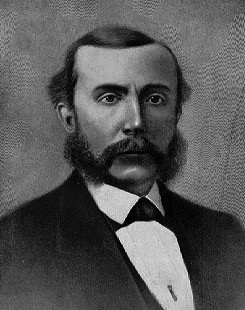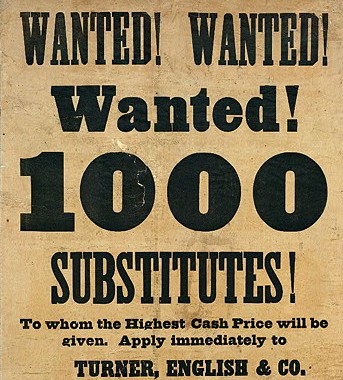John D. Rockefeller in the Civil War
Dan Bryan, April 13 2012
Like many men in Cleveland, Rockefeller was a Republican and a fervent abolitionist. Having been primarily populated by New England transplants, that city was immune to any of the anti-war, Democratic sentiment that took root in places like New York City or southern Ohio. His religious austerity made Rockefeller a natural abolitionist and in 1860, barely past the age of twenty-one, he cast his first ballot for Abraham Lincoln.
Cuyahoga County, where Cleveland is located, had a population of 50,000 in 1860, and 10,000 of them joined the Union Army. They formed some of Ohio's most renowned regiments and took heavy casualties.
Rockefeller was unable to answer the call of the bugle, however. He had started a shipping business shortly before the war broke out, and thanks to the traits of his father he was the primary means of support for his mother and younger siblings. Leaving for the army would have doomed the shipping business to failure and risked poverty for his family.
Business profits and the Civil War
Rockefeller's shipping business prospered mightily as the Civil War progressed.
The first casualty of the war had been the bountiful trade of the Mississippi River. This drove Mark Twain to Nevada, and it drove the shipment of Midwestern crops to the east, directly through Cleveland. At the same time government contracts for food, clothes, and guns were being written at a furious pace. Suddenly the well-placed port became a lot more bustling.
Rockefeller's shipping firm took full advantage, booking a profit of $17,000 in 1862. This represented a fourfold increase from their antebellum norm. The warehouse became packed with salt, clover seed, pork, and other supplies for the war efforts.
By this point -- still only twenty-three years old -- Rockefeller was sitting on so much extra cash that he began to look around for other investment opportunities. As it would happen, providence had placed his firm a hundred miles from one of the most revolutionary developments in human history -- the Titusville oil wells.
Rockefeller's investment in the oil wells of Pennsylvania
By the mid 1850s, the golden age of whaling had eclipsed. The oil that this industry produced increased in price, increasing the cost of illumination. To the extent that industries needed lubrication, they too were hamstrung.
It was in response to this that a group of New Englanders dispatched Colonel Edmund Drake to some oil deposits near Titusville, Pennsylvania. His task was to devise some method of obtaining the oil in large enough quantities to maintain a business.
"Colonel Drake" was no more of a colonel than Colonel Sanders -- the title was a mere contrivance -- but he did solve the problem that was given to him. After first attempting to shovel the oil out of the ground by hand, he developed a method of drilling for it. The results were spectacular. He struck oil on August 28, 1859 and it did not take long for the speculative fever of this news to spread.
Cleveland was the nearest big city to the new oil fields, and became a natural shipping point. A chemist named Samuel Andrews was one of the few men who knew the refining process well, and he leveraged his social connections to Rockefeller. Considering it to be a side investment, the firm invested $4,000 into Andrews's venture and became partners.
Cleveland becomes a center of oil refining
Since there was no way of knowing how much oil was in the ground, most drillers and refiners treated the business as a transient phenomenon. Those who made money pocketed that money -- few tried to invest for the long-term. In the first days of the boom, anyone who wasn't on the battlefields could make good money with a fly-by-night refinery, while institutional bankers were scared off by the wild price swings. One such swing saw the price drop from $20.00 to $0.10 a barrel.
Refineries exploded so frequently that they were banned within the city limits of Cleveland. The process also produced a waste product called gasoline, which was highly flammable and would ruin the illuminating oil. A lot of refineries dumped this into the Cuyahoga River, and soon the river itself was prone to ignite. The entire city took on an infernal hue as smoke billowed into the sky.
A disagreement on business strategy: Rockefeller and Maurice Clark
Rockefeller wanted to bring order and a long-term outlook to this business, including the use of leverage to expand his operations. His partner at the time, Maurice Clark, preferred to operate on a cash-only basis and pocket the short term profits. Clark was one of those who saw the oil fields as a short-term windfall -- not something worth taking a longer-term gamble on.
By 1863, Rockefeller chafed at the influence of his partner, and began plotting on ways to buy him out. The situation was exacerbated when Maurice brought in his brother James -- a former prize fighter -- to work in the business. The Clark brothers were hard-living, hard-drinking men and Rockefeller was finding the situation morally and personally intolerable. James openly bragged about some scams he had pulled in the oil fields, and Rockefeller deduced that he himself might be the next target of any chicanery.
Always methodical, Rockefeller kept these thoughts to himself until he could be assured of the financial backing that he needed. In the meantime, profit was pouring in to the partnership. Rockefeller saved nearly all of it, even though the amounts made him a wealthy man by the standards of those times.
Rockefeller hires a substitute draftee in the Civil War
Also in 1863, the United States instituted a draft, hoping to shift the balance of a deadlocked war. The criteria for eligibility was wide, but there was a key exemption. It was possible to pay a "substitute" to report in one's place. Rockefeller took advantage of this and hired an unknown person to serve in his place for the remainder of the war. There is no record of who this man was, or of the fate that befell him.
Of course, the fact that Rockefeller could hire a substitute at all was no small feat, given the circumstances of his childhood.
Rockefeller takes control of his firm
By the start 1865, Rockefeller had the financial support and savings that he needed to buy his main partner out (Samuel Andrews would keep his small share). His intentions, carefully kept secret for two years, were now brought out into the open. At an opportune moment in the midst of a loud argument, Rockefeller suggested that they terminate the partnership. After whatever finagling was necessary, Maurice Clark agreed to auction off his piece of the business.
To Clark's surprise, none other than John D. Rockefeller was waiting at the auction, and he was bidding aggressively. The final price was steep -- $72,500 -- but the rewards would more than compensate. At the age of twenty-five, Rockefeller had purchased effective control of the largest oil refinery in the largest refining market in the United States.
Two months later, the Civil War ended. As with other business titans of the Gilded Age -- J.P. Morgan for example -- one can only speculate on Rockefeller's fate had he joined the Union Army for those defining years of his young life.
Recommendations/Sources
- Ron Chernow - Titan: The Life of John D. Rockefeller, Sr.
- Daniel Yergin - The Prize




